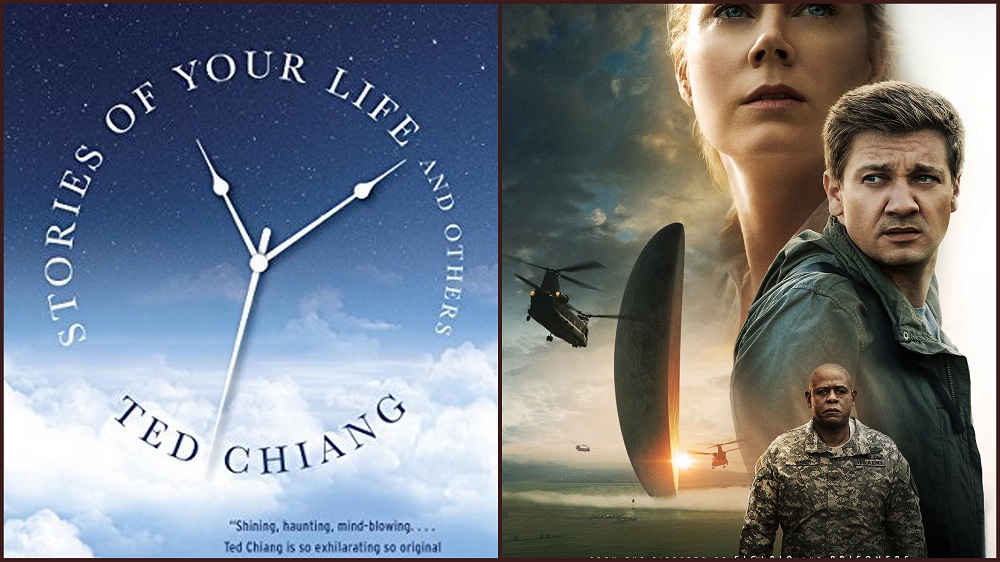

- Heptapod story of your life how to#
- Heptapod story of your life movie#
- Heptapod story of your life series#
But we encounter the world, as all humans do, as a chronological series of events that cause future events. Does the aliens’ seemingly perfect knowledge of future events mean that they do not make decisions? Chiang’s Louise, with her taste of future knowledge, speculates, “What if the experience of knowing the future changed a person? What if it evoked a sense of urgency, a sense of obligation to act precisely as she knew she would?” So perhaps a teleological being is an unfree one, bound not by chains but by a sense of the rightness of the future.Ĭhristians believe the world is teleological, as the heptapods do. In short, the aliens are teleological beings, and they do not experience time linearly-instead, they have “a simultaneous mode of awareness.” Louise, in learning their language, also gains glimpses outside of time, as the life of a daughter she doesn’t yet have floods into her mind like memories of the future. The aspects of physics that are strangest for human scientists (because they describe light’s behavior as goal-oriented) are most intuitive for the aliens. They write the complex symbols (“almost like mandalas”) of their language without caring where they start. It is the end or purpose of an event that ripples back in time to explain it. (Those afraid of spoilers, beware.) The aliens have a wholly different understanding of time than we humans-to them, cause-and-effect are ephemeral.

Story and film both have Louise become a kind of prophet as she learns more and more Heptapod B. Louise encounters them first through a glass, darkly, and then, in a climactic scene, face-to-face. They exude ink from their limbs to write on the air. These heptapods, while still seven-limbed, are towering shapes that emerge out of enshrouding mist. The film, by contrast, offers us immediately numinous aliens. Chiang describes the aliens as oddly shaped but relatively unimpressive, “heptapods” that each look like “a barrel suspended at the intersection of seven limbs.” It is only when Louise immerses herself in the written language of the heptapods (Heptapod B) that she gets the sense of contact, not simply with something foreign but with something transcendent. Ted Chiang’s short story “ Story of Your Life” serves as the inspiration for the film. Adams convincingly plays a gifted scholar who is in over her head, until she starts seeing the world from the aliens’ viewpoint and gets glimpses beyond the limits of human consciousness. Her military handlers, suspicious of the extraterrestrials’ intentions, want her to do this without teaching them English.
Heptapod story of your life how to#
In the film, as in the short story it is based on, the aliens' perspective differs from humans' in being more teleological-and thus more theological.Īrrival stars Amy Adams as a linguist named Louise Banks who is tasked with learning how to speak to the aliens who have arrived in monolithic ships all over the earth.

So it isn't purely for the sake of a shameless plug that I connect Arrival and First Things.

People have taken to Facebook and Twitter to solicit suggestions, and I’ve been happy to see many readers of First Things, liberal and conservative, of any faith or none, laud this journal as a crucial religious venue for deep thought on our culture and public life.įirst Things strives to look at not only the political horserace and the cultural skirmishes, but also the underlying philosophical questions: What good do we seek? What do we hold sacred? And for what end were we made? And we hope that those who read our pages will not just receive our words but be changed by them. On social media, I have seen many take a different tack, seeking out reputable journals with varied perspectives to help broaden their understanding of our times. Vance’s Hillbilly Elegy and venturing afield to more speculative dystopian fare, such as Michel Houellebecq’s Submission. In the New York Times, Ross Douthat offers a reading list of books for our turbulent era, starting with J. But it's also a sentiment I've seen again and again in the media since this November: the idea that America is a nation divided between citizens with mutually unintelligible cultures and concerns.
Heptapod story of your life movie#
This is the premise of the most philosophical blockbuster of 2016, Arrival, a movie that belongs on any best-of-the-year list. Communication between different ideological worlds has never been more necessary and never seemed more impossible.


 0 kommentar(er)
0 kommentar(er)
